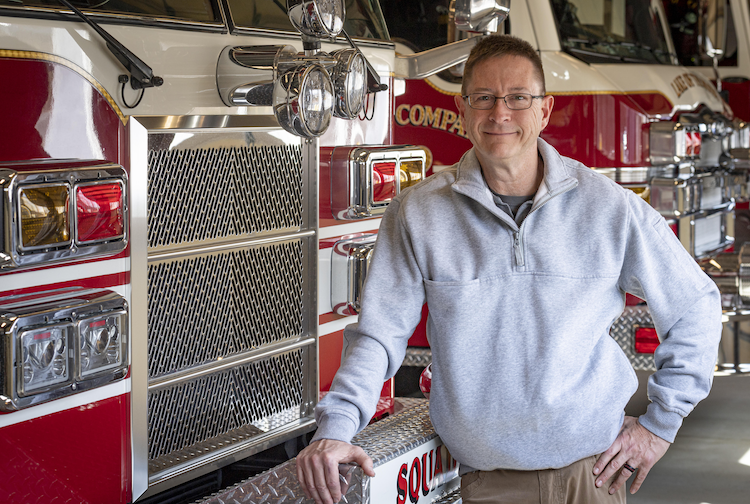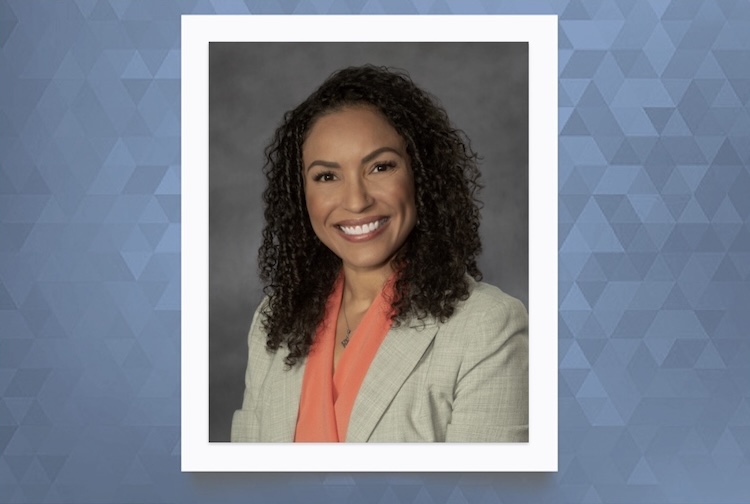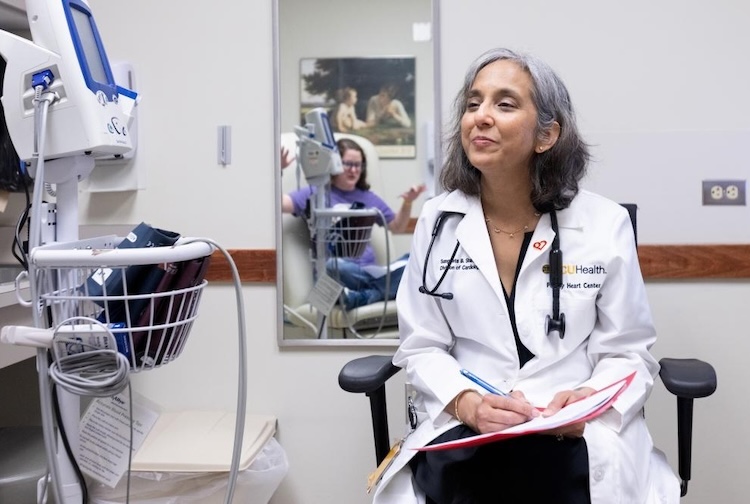Cardio-oncology: Protecting the heart health of cancer patients
VCU Massey Cancer Center and VCU Health Pauley Heart Center provide unique approaches to cardiovascular care and research.
February 23, 2023 VCU and VCU Health have received national notoriety for team members' research and patient care. Some individuals contributing to this work include (from left to right) David Chuquin, M.D., Emily Hulburt Baker, AGACNP, Wendy Bottinor, MD, MSCI, Delia Endicott, ACNP, Ann McRae, RN. (VCU Massey Cancer Center)
VCU and VCU Health have received national notoriety for team members' research and patient care. Some individuals contributing to this work include (from left to right) David Chuquin, M.D., Emily Hulburt Baker, AGACNP, Wendy Bottinor, MD, MSCI, Delia Endicott, ACNP, Ann McRae, RN. (VCU Massey Cancer Center)
By Blake Belden
Advances in care are leading to better outcomes for cancer patients, but some cancer treatments can lead to negative impacts on the heart and cardiovascular system, including high blood pressure, irregular heartbeats, heart disease and heart failure.
For many cancer patients who have completed treatment and are years out from their diagnosis, their risk of death from heart disease can be higher than their risk of death from cancer.
The emerging field of cardio-oncology is paving the way for expert, multidisciplinary heart care before, during and after cancer treatment to mitigate adverse effects on cardiovascular health.
VCU and VCU Health's role in cardio-oncology
Virginia Commonwealth University was recently named as a 2023 International Cardio-Oncology Society (IC-OS) Center of Excellence, receiving the top award of Gold Status for providing high-quality, comprehensive and interdisciplinary heart-related care for patients. VCU is the only medical institution in Virginia to hold this designation.
VCU Massey Cancer Center has also been an international leader in this field for the last 10 years. The cardio-oncology team at Massey and VCU Health Pauley Heart Center offers seamless care for patients during cancer treatment and throughout survivorship, including management of risk factors that may cause heart disease, treatment of late cardiovascular effects of cancer therapy and opportunities to participate in cutting-edge clinical research.
Through ongoing collaborations between multidisciplinary specialists at Massey and Pauley, doctors and scientists across the university and health system are leading a number of clinical trials and research projects investigating more effective strategies for protecting the heart health of cancer patients, from improved monitoring techniques to novel drug combinations.
Cancer treatment and heart damage
Damage to the heart caused by chemotherapy or other cancer treatments is known as cardiotoxicity. Cardiotoxicity can occur through many mechanisms, including direct damage to heart cells, damage to vessels supplying blood to the heart or through inflammation. It increases a person's risk of heart disease or failure. In addition to studying the direct effects of treatments on the heart, researchers also recognize and seek to address disparities that exist in certain minority populations with an increased burden of heart disease related to cancer treatment.
Studies are currently being pursued by several VCU researchers and doctors to develop novel preventive and therapeutic strategies for cardio-oncology care as well as racial disparities in care.
For example, Arnethea Sutton, Ph.D., a member of the CPC research program at Massey and assistant professor in the Department of Kinesiology & Health Sciences at the VCU College of Humanities and Sciences, investigates the roles of psychosocial, sociocultural and cancer care delivery factors that contribute to treatment-related cardiovascular toxicities and poorer outcomes in Black women with breast cancer.
She currently holds grant funding from the National Cancer Institute to unpack the drivers of racial disparities in cardiovascular toxicities among breast cancer survivors.
“Findings from this study may offer opportunities to develop multilevel interventions seeking to improve cardiovascular outcomes in breast cancer survivors by addressing racial disparities associated with cardiotoxicity,” Sutton said.
Promoting healthy lifestyle choices and interventions
Regular physical activity helps maintain healthy weight, energy levels and overall health. However, children and young adult cancer survivors are often less active than their peers who have not had cancer treatment.
A number of clinical trials are being conducted to explore the impacts of activity trackers, patient education and support groups are believed to support the reduction of cardiovascular health risks.
Madhu Gowda, M.B.B.S., pediatric hematologist-oncologist at the Children's Hospital of Richmond at VCU and member of the DT research program at Massey, leads a clinical trial evaluating the effects of an intervention plan on the cardiometabolic health and health-related quality of life among survivors of childhood cancers. It incorporates the use of a Fitbit, individualized goal setting and social media support groups.
How are MRIs used to monitor heart health?
Additionally, Mary Helen Hackney, M.D., medical oncologist and director of community oncology at Massey, is overseeing a clinical trial that examines the effects of a cardiovascular health assessment tool among cancer survivors.
The intended goal of this multi-center trial is to help initiate more heart health discussions between cancer survivors and their oncology providers, increase routine visits by cancer survivors to primary care and heart specialists, and to influence an uptick in risk reduction and healthy lifestyle activities among survivors.
"This trial is focused on breast cancer survivors, but it can be a launchpad for similar studies with other cancer survivors," Hackney said. "With more and more survivors each year, it is important that we maximize good cardiovascular health and overall wellbeing. This will help non-oncology providers as these patients return to their standard care, and it will help patients understand what they need to do to remain healthy many years beyond their cancer treatment."




